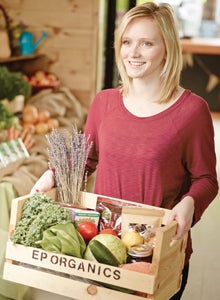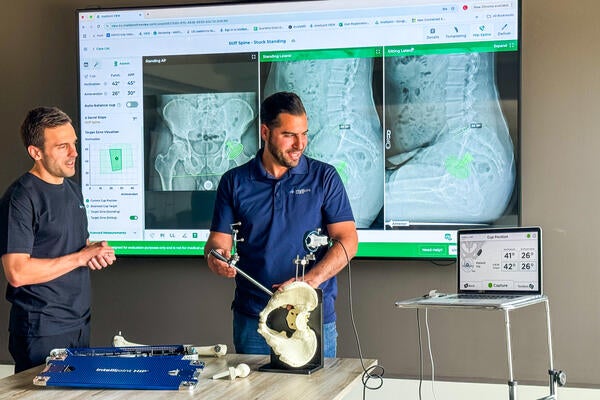
From enterprise co-op student to business owner
Emily Peat is the first Waterloo student to graduate with the entrepreneurship option in engineering

Emily Peat is the first Waterloo student to graduate with the entrepreneurship option in engineering
By Staff Faculty of Engineering Emily Peat started her undergraduate degree like most young people - with a desire to study hard and prepare for a career. This week she graduates from the University of Waterloo as a partner in her own business.
Emily Peat started her undergraduate degree like most young people - with a desire to study hard and prepare for a career. This week she graduates from the University of Waterloo as a partner in her own business.
Peat, a new grad of Waterloo’s civil and environmental engineering program, is already a full business partner at Eat Green Organics. She’s also the first Waterloo student to graduate with the option in entrepreneurship, a new initiative started last fall for engineering students interested in venture creation or corporate entrepreneurship.
“The entrepreneurship option blends the technical, problem-solving nature of engineering with the creative, fast-paced nature of business,” says Peat. “I have created my own job. Upon graduation, I can contribute to employment opportunities for other people and I get to work on something I believe in everyday.”
She started an organic food delivery business, EcoPlace Organics, during an Enterprise Co-op (E Co-op) term while she was in her third-year. E Co-op is a program run through Waterloo’s Conrad Centre for Business, Entrepreneurship and Technology. With the support of mentors and professionals in industry, students take a co-op term to develop their own business. Throughout the term, students also have access to workspace, seminars, conferences and presentations.
“Emily has grown her company with passion, and her entrepreneurial adventures have been filled with many ups and downs – creating, building and operating her own startup business meant making difficult decisions every day,” said Wayne Chang, a lecturer and the enterprise co-op coordinator at the Conrad Centre.
One invaluable experience for Peat was the merger last year of her startup with Eat Green Organics. The merger has increased efficiencies and helped both business owners better share their mission to build healthy communities by supporting organic food producers.
“When it really comes down to it, we are in this every day because we are passionate about the same idea: a local food system that values sustainable agriculture and healthy communities,” said Peat. “We are so much more efficient when we pool our resources and work together."

Read more
Two University of Waterloo affiliated health-tech companies secure major provincial investment to bring lifesaving innovations to market

Read more
How Doug Kavanagh’s software engineering degree laid the foundation for a thriving career in patient care

Read more
Upside Robotics secures new funding to accelerate the future of sustainable farming
Read
Engineering stories
Visit
Waterloo Engineering home
Contact
Waterloo Engineering
The University of Waterloo acknowledges that much of our work takes place on the traditional territory of the Neutral, Anishinaabeg, and Haudenosaunee peoples. Our main campus is situated on the Haldimand Tract, the land granted to the Six Nations that includes six miles on each side of the Grand River. Our active work toward reconciliation takes place across our campuses through research, learning, teaching, and community building, and is co-ordinated within the Office of Indigenous Relations.